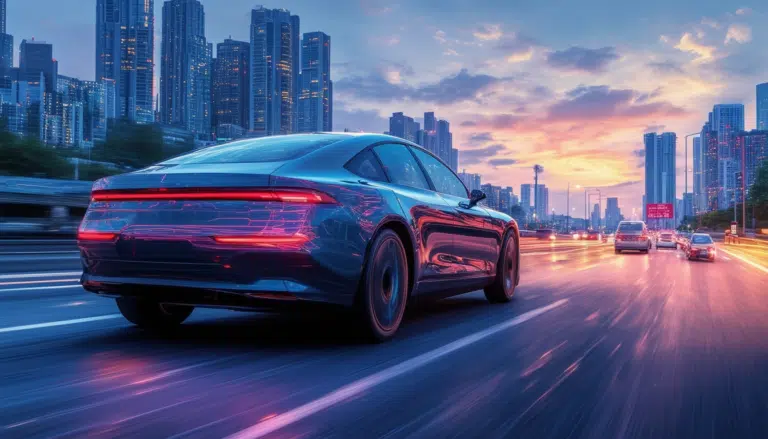Transforming electrification in the automotive industry: the sustainable path to business competitiveness in Mexico
The electrification in the automotive industry has become a crucial element for driving sustainability and business competitiveness in Mexico. As the demand for electric vehicles (EVs) and clean energy solutions grows, automotive companies are adapting to these new trends to remain relevant in the market. This transition not only responds to environmental regulations, but also aims to meet the changing expectations of consumers who value commitment to sustainability. In this context, companies must carefully evaluate their strategies and consider the adoption of technologies that promote inclusive and responsible development.
The electrification of the automotive industry represents a unique opportunity for Mexican companies to innovate, reduce costs, and position themselves favorably in an increasingly demanding market. This transition has a dual advantage: reducing carbon footprints and increasing business competitiveness through electric mobility. Electric vehicles (EVs) offer companies the possibility of optimizing their operations and aligning with the necessary environmental standards for a sustainable future.
Economic advantages of electrification
The economic advantages provided by electrification are numerous. Among the most notable benefits is the reduction of operational costs. Electric vehicles can significantly decrease expenses on fuel and maintenance, resulting in long-term savings. Moreover, many companies can benefit from tax incentives that include tax exemptions and government promotions for adopting clean technologies.
Impact on corporate sustainability
The adoption of electric mobility not only has economic benefits but also impacts companies’ sustainability strategies. Increasingly, organizations in Mexico are aligning their corporate objectives with practices that aim to be more environmentally friendly. Aligning these objectives with society leads to a better corporate image in addition to complying with environmental regulations.
Improvement of operational efficiency
The implementation of technologies such as hybrid and electric vehicles has led to a notable improvement in operational efficiency. Companies have experienced a reduction in downtime, resulting in greater reliability in their operations. This improvement in efficiency also translates into cost optimization and an increase in productivity. A clear example is that electric vehicles can operate independently of environmental contingencies, ensuring their functionality in various situations.
Challenges in the transition to sustainable mobility
Despite the evident benefits, the transition to sustainable mobility faces several challenges. One of the main obstacles is the insufficient infrastructure, marked by a shortage of charging stations and adequate energy networks. On the other hand, the high initial costs for acquiring electric vehicles and renewable technologies can be a significant barrier, especially for small and medium-sized enterprises.
The future of electrification in Mexico
Despite these challenges, the future of automotive electrification in Mexico looks promising. With investments in charging infrastructure and a growing demand for electric vehicles, the automotive sector has the potential to drive a greener economy. Government incentives are designed to stimulate this transition, contributing to job creation and attracting investments.
Consolidation of strategies for business success
For companies to face the challenges and maximize the potential of electrification, it is essential to focus efforts on several key strategies. Evaluating return on investment through a long-term cost-benefit analysis is essential. Additionally, seeking government incentives, as well as support programs and available tax benefits, is crucial. Investing in training is vital to prepare the workforce for the use of new technologies, as well as fostering strategic alliances with suppliers and other organizations.
Importance of education and awareness
A key aspect of this transformation is education about the importance of energy efficiency and the responsible use of resources. Awareness programs are fundamental to ensure that both employees and consumers understand the benefits of electrification and adopt a sustainable approach in their daily lives.
Conclusions on electric mobility in Mexico
On the path to sustainable business competitiveness, the electric transformation in Mexico’s automotive industry stands out as a necessity and an opportunity. This transition not only improves the economic results of companies but also opens the door to a new era of environmental and social responsibility. The commitment to cleaner and more efficient mobility may be the key to a successful and sustainable business future.
The electrification in the Mexican automotive industry represents an unprecedented opportunity to strengthen business competitiveness. As companies adopt electric vehicles (EVs) and sustainable technologies, they can take advantage of reduced operational costs, resulting in significant savings on fuel and maintenance. This transition not only promotes efficiency but also stimulates greater energy independence, a crucial aspect in a world increasingly affected by energy instability.
In addition to the economic benefits, electric mobility is contributing to a more robust corporate image, aligning with the expectations of consumers who value environmental commitments. Companies that implement sustainable strategies not only comply with environmental regulations but also improve their reputation, translating into greater customer satisfaction and loyalty. This shift has resulted in a landscape where sustainability becomes a differentiating element in the market.
However, despite the undeniable benefits of the shift towards electrification, the industry faces significant challenges. The insufficient infrastructure and high initial costs are challenges that must be addressed to facilitate an effective transition. Collaboration between the private sector and the government is essential to promote the development of charging station networks and offer incentives to make investments in electric technologies more attractive.
In summary, the electric transformation in the automotive industry is not only a necessary step towards a more sustainable future but also represents a clear pathway towards improving business competitiveness in Mexico. Adapting to this new reality will allow companies to position themselves effectively in a constantly changing global environment.




